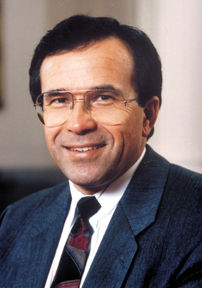Browse "Politicians"
-
Article
Fred Gardiner
Frederick Goldwin Gardiner, lawyer, politician (b at Toronto 21 Jan 1895; d there 22 Aug 1983). A law graduate of Osgoode Hall (1920), Gardiner began his political career in 1936 as deputy reeve of Forest Hill, a suburban village in north Toronto.
"https://development.thecanadianencyclopedia.ca/images/tce_placeholder.jpg?v=e9dca980c9bdb3aa11e832e7ea94f5d9" // resources/views/front/categories/view.blade.php
https://development.thecanadianencyclopedia.ca/images/tce_placeholder.jpg?v=e9dca980c9bdb3aa11e832e7ea94f5d9
-
Article
Fred Rose
Fred Rose, union organizer, politician (b Fred Rosenberg at Lublin, Poland 7 Dec 1907; d at Warsaw, Poland 16 Mar 1983). Rose moved with his parents to Montréal. In the 1930s, as a member of the Young Communist League, he organized unions of unemployed and unskilled workers.
"https://d2ttikhf7xbzbs.cloudfront.net/media/media/61299676-2265-417c-a7a2-eff255a2056a.jpg" // resources/views/front/categories/view.blade.php
https://d2ttikhf7xbzbs.cloudfront.net/media/media/61299676-2265-417c-a7a2-eff255a2056a.jpg
-
Article
Frederic William Cumberland
Frederic William Cumberland, engineer and architect, railway manager and legislator (b at London, Eng 10 April 1820; d at Toronto 5 August 1881). Known in his own day as a railway manager and politician, today he is celebrated as one of Toronto's leading 19th-century architects.
"https://development.thecanadianencyclopedia.ca/images/tce_placeholder.jpg?v=e9dca980c9bdb3aa11e832e7ea94f5d9" // resources/views/front/categories/view.blade.php
https://development.thecanadianencyclopedia.ca/images/tce_placeholder.jpg?v=e9dca980c9bdb3aa11e832e7ea94f5d9
-
Article
Frederick Charles Alderdice
Frederick Charles Alderdice, businessman, politician (b at Belfast, Ire 10 Nov 1872: d at St John's 26 Feb 1936). He was twice prime minister of Newfoundland, August-November 1928 and June 1932-February 1934, and the last person to hold that office before confederation with Canada.
"https://development.thecanadianencyclopedia.ca/images/tce_placeholder.jpg?v=e9dca980c9bdb3aa11e832e7ea94f5d9" // resources/views/front/categories/view.blade.php
https://development.thecanadianencyclopedia.ca/images/tce_placeholder.jpg?v=e9dca980c9bdb3aa11e832e7ea94f5d9
-
Article
Frederick Peters
Frederick Peters, lawyer, premier of PEI (b at Charlottetown 8 Apr 1852; d at Prince Rupert, BC 29 July 1919). A brother of Arthur PETERS, Frederick was elected to the assembly in 1890 as a Liberal and became premier 22 April 1891, serving until resigning on 27 October 1897.
"https://development.thecanadianencyclopedia.ca/images/tce_placeholder.jpg?v=e9dca980c9bdb3aa11e832e7ea94f5d9" // resources/views/front/categories/view.blade.php
https://development.thecanadianencyclopedia.ca/images/tce_placeholder.jpg?v=e9dca980c9bdb3aa11e832e7ea94f5d9
-
Article
Frederick Seymour
Frederick Seymour, colonial administrator, governor of BC (b at Belfast, Ire 6 Sept 1820; d at Bella Coola, BC 10 June 1869).
"https://development.thecanadianencyclopedia.ca/images/tce_placeholder.jpg?v=e9dca980c9bdb3aa11e832e7ea94f5d9" // resources/views/front/categories/view.blade.php
https://development.thecanadianencyclopedia.ca/images/tce_placeholder.jpg?v=e9dca980c9bdb3aa11e832e7ea94f5d9
-
Article
Frederick Tennyson Congdon
Frederick Tennyson Congdon, lawyer, politician, commissioner of the Yukon Territory, MP (b at Annapolis, NS 16 Nov 1858; d at Ottawa 13 Mar 1932). Although Congdon was a dynamic speaker and shrewd organizer, his tenure as Yukon Commissioner was characterized by corruption and controversy.
"https://development.thecanadianencyclopedia.ca/images/tce_placeholder.jpg?v=e9dca980c9bdb3aa11e832e7ea94f5d9" // resources/views/front/categories/view.blade.php
https://development.thecanadianencyclopedia.ca/images/tce_placeholder.jpg?v=e9dca980c9bdb3aa11e832e7ea94f5d9
-
Article
Gary Filmon
In 1983 Filmon succeeded Sterling LYON as Conservative leader and on 9 May 1988 formed a minority government after defeating the incumbent New Democrats.
"https://d2ttikhf7xbzbs.cloudfront.net/media/media/abf440a3-3a1c-4e43-ba40-a1ea523e08fb.jpg" // resources/views/front/categories/view.blade.php
https://d2ttikhf7xbzbs.cloudfront.net/media/media/abf440a3-3a1c-4e43-ba40-a1ea523e08fb.jpg
-
Article
Gédéon Ouimet
Gédéon Ouimet, premier of Québec (b at Ste-Rose, Qué, 2 June 1823; d at Saint-Hilaire-de- Dorset, Qué 23 Apr 1905). Conservative premier for 19 months (February 1873 to September 1874), he was forced to resign by financial scandals.
"https://development.thecanadianencyclopedia.ca/images/tce_placeholder.jpg?v=e9dca980c9bdb3aa11e832e7ea94f5d9" // resources/views/front/categories/view.blade.php
https://development.thecanadianencyclopedia.ca/images/tce_placeholder.jpg?v=e9dca980c9bdb3aa11e832e7ea94f5d9
-
Article
George Alexander Drew
In 1948 he entered national politics as party leader, but he failed in 2 elections to mount an effective challenge to the Liberal administration. He resigned as leader 1956 and was appointed Canadian high commissioner to London, England, in 1957 - the last distinction in a noteworthy public career.
"https://d2ttikhf7xbzbs.cloudfront.net/media/media/24c01d26-4fa9-4190-9f79-0055d200812d.jpg" // resources/views/front/categories/view.blade.php
https://d2ttikhf7xbzbs.cloudfront.net/media/media/24c01d26-4fa9-4190-9f79-0055d200812d.jpg
-
Article
George Anthony Walkem
Associated with Amor DE COSMOS in the Confederation League before BC joined CONFEDERATION, George Walkem became attorney general in De Cosmos's Cabinet and succeeded him as premier on 11 Feb 1874.
"https://d2ttikhf7xbzbs.cloudfront.net/media/media/9b976a8f-cb13-40e4-b530-5a728534a8a9.jpg" // resources/views/front/categories/view.blade.php
https://d2ttikhf7xbzbs.cloudfront.net/media/media/9b976a8f-cb13-40e4-b530-5a728534a8a9.jpg
-
Article
George Black
George Black, lawyer, politician, commissioner of the Yukon Territory, MP (b at Woodstock, NB 10 Apr 1873; d at Vancouver, BC 23 Aug 1965).
"https://development.thecanadianencyclopedia.ca/images/tce_placeholder.jpg?v=e9dca980c9bdb3aa11e832e7ea94f5d9" // resources/views/front/categories/view.blade.php
https://development.thecanadianencyclopedia.ca/images/tce_placeholder.jpg?v=e9dca980c9bdb3aa11e832e7ea94f5d9
-
Article
George Brown
George Brown, journalist, politician, senator, cattle breeder (born 29 November 1818 in Alloa, Scotland; died 9 May 1880 in Toronto, ON). George Brown played an instrumental role in Confederation. A Reformer who helped bring responsible government to Upper Canada, he orchestrated the great coalition of 1864, which pushed British North America toward Confederation. He participated in the Charlottetown Conference and the Quebec Conference in 1864 and is considered a Father of Confederation. Brown’s journalistic legacy is also significant. His Globe newspaper ushered in the beginning of Canada’s big newspaper business. The widely read Globe was a vigorous force in Upper Canada politics in the 1850s. Today, it is Canada’s major daily newspaper, the Globe and Mail.
"https://d2ttikhf7xbzbs.cloudfront.net/media/media/407f0fe6-9a89-4187-b3af-b6293f8c1155.jpg" // resources/views/front/categories/view.blade.php
https://d2ttikhf7xbzbs.cloudfront.net/media/media/407f0fe6-9a89-4187-b3af-b6293f8c1155.jpg
-
Speech
George Brown: 1865 Speech in Favour of Confederation
George Brown played an instrumental role in establishing Confederation. As leader of the Clear Grits (forerunner of the Liberal Party) in Canada West, he set aside political differences and allied with his Conservative rivals John A. Macdonald and George-Étienne Cartier in 1864, with whom he pitched Confederation to the Atlantic colonies at the Charlottetown and Québec Conferences. From 3 February to 13 March 1865, politicians in the Province of Canada debated the terms of Confederation, offering some of the most compelling defences and critiques of the union of British North American colonies. In the following speech, delivered before the legislature of the Province of Canada on 8 February 1865, Brown explains his reasons for supporting Confederation.
"https://d2ttikhf7xbzbs.cloudfront.net/media/media/10fcd08d-1fbd-4e55-8095-4cecc071b416.jpg" // resources/views/front/categories/view.blade.php
https://d2ttikhf7xbzbs.cloudfront.net/media/media/10fcd08d-1fbd-4e55-8095-4cecc071b416.jpg
-
Editorial
George Brown of the Globe
The following article is an editorial written by The Canadian Encyclopedia staff. Editorials are not usually updated.
"https://d2ttikhf7xbzbs.cloudfront.net/media/media/10fcd08d-1fbd-4e55-8095-4cecc071b416.jpg" // resources/views/front/categories/view.blade.php
https://d2ttikhf7xbzbs.cloudfront.net/media/media/10fcd08d-1fbd-4e55-8095-4cecc071b416.jpg
